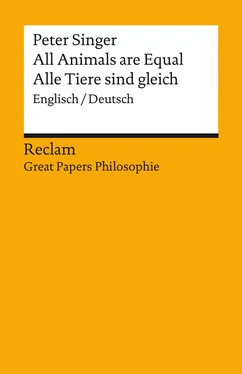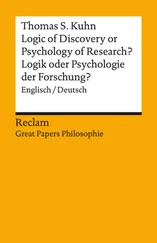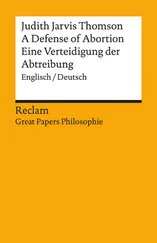Much of this pointless cruelty goes on in the universities. In many areas of science, non-human animals are regarded as an item of laboratory equipment, to be used and expended as desired. In psychology laboratories experimenters devise endless variations and repetitions of experiments that were of little value in the first place. To quote just one example, from the experimenter’s own [110] account in a psychology journal: at the University of Pennsylvania, Perrin S. Cohen hung six dogs in hammocks with electrodes taped to their hind feet. Electric shock of varying intensity was then administered through the electrodes. If the dog learnt to press its head against a panel on the left, the shock was turned off, but otherwise it remained on indefinitely. Three of the dogs, however, were required to wait periods varying from 2 to 7 seconds while being shocked before making the response that turned off the current. If they failed to wait, they received further shocks. Each dog was given from 26 to 46 ‘sessions’ in the hammock, each session consisting of 80 ‘trials’ or shocks, administered at intervals of one minute. The experimenter reported that the dogs, who were unable to move in the hammock, barked or bobbed their heads when the current was applied. The reported findings of the experiment were that there was a delay in the dogs’ responses that increased proportionately to the time the dogs were required to endure the shock, but a gradual increase in the intensity of the shock had no systematic effect in the timing of the response. The experiment was funded by the National Institutes of Health, and the United States Public Health Service.9
In this example, and countless cases like it, the possible benefits to mankind are either non-existent or fantastically remote; while the certain losses to members of other species are very real. This is, again, a clear indication of speciesism.
In the past, argument about vivisection has often missed the point, because it has been put in absolutist terms: Would the abolitionist be prepared to let thousands die if they could be saved by experimenting on a single animal? The way to reply to this purely hypothetical question is to pose another: Would the experimenter be prepared to perform his experiment on an orphaned human infant, if that were the only way to save many lives? (I say ‘orphan’ to avoid the complication of parental feelings, although in doing so I am being overfair to the experimenter, since the nonhuman subjects of experiments are not orphans.) If the experimenter is not prepared to use an orphaned human infant, then his readiness to use nonhumans is simple discrimination, since adult apes, cats, mice, and other mammals are more aware of what is happening to them, more self-directing and, so far as we can tell, at least as sensitive to pain, as any human infant. There seems to be no relevant characteristic that human infants possess that adult mammals do not have to the same or a higher degree. (Someone might try to argue that what makes it wrong to experiment on a human infant is that the infant will, in time and if left alone, develop into more than the nonhuman, but one would then, to be consistent, have to oppose abortion, since the fetus has the same potential as the infant – indeed, even contraception and abstinence might be wrong on this ground, since the egg and sperm, considered jointly, also have the same potential. In any case, this argument still gives us no reason for selecting a nonhuman, rather than a human with severe and irreversible brain damage, as the subject for our experiments).
The experimenter, then, shows a bias in favor of his own species whenever he carries out an experiment on a nonhuman for a purpose that he would not think justified him in using a human being at an equal or lower level of [111] sentience, awareness, ability to be self-directing, etc. No one familiar with the kind of results yielded by most experiments on animals can have the slightest doubt that if this bias were eliminated the number of experiments performed would be a minute fraction of the number performed today.
Experimenting on animals, and eating their flesh, are perhaps the two major forms of speciesism in our society. By comparison, the third and last form of speciesism is so minor as to be insignificant, but it is perhaps of some special interest to those for whom this article was written. I am referring to speciesism in contemporary philosophy.
Philosophy ought to question the basic assumptions of the age. Thinking through, critically and carefully, what most people take for granted is, I believe, the chief task of philosophy, and it is this task that makes philosophy a worthwhile activity. Regrettably, philosophy does not always live up to its historic role. Philosophers are human beings, and they are subject to all the preconceptions of the society to which they belong. Sometimes they succeed in breaking free of the prevailing ideology: more often they become its most sophisticated defenders. So, in this case, philosophy as practiced in the universities today does not challenge anyone’s preconceptions about our relations with other species. By their writings, those philosophers who tackle problems that touch upon the issue reveal that they make the same unquestioned assumptions as most other humans, and what they say tends to confirm the reader in his or her comfortable speciesist habits.
I could illustrate this claim by referring to the writings of philosophers in various fields – for instance, the attempts that have been made by those interested in rights to draw the boundary of the sphere of rights so that it runs parallel to the biological boundaries of the species homo sapiens, including infants and even mental defectives, but excluding those other beings of equal or greater capacity who are so useful to us at mealtimes and in our laboratories. I think it would be a more appropriate conclusion to this article, however, if I concentrated on the problem with which we have been centrally concerned, the problem of equality.
It is significant that the problem of equality, in moral and political philosophy, is invariably formulated in terms of human equality. The effect of this is that the question of the equality of other animals does not confront the philosopher, or student, as an issue itself – and this is already an indication of the failure of philosophy to challenge accepted beliefs. Still, philosophers have found it difficult to discuss the issue of human equality without raising, in a paragraph or two, the question of the status of other animals. The reason for this, which should be apparent from what I have said already, is that if humans are to be regarded as equal to one another, we need some sense of ‘equal’ that does not require any actual, descriptive equality of capacities, talents or other qualities. If equality is to be related to any actual characteristics of humans, these characteristics must be some lowest common denominator, pitched so low that no human lacks them – but then the philosopher comes up against the catch that any such set of characteristics which covers all humans will not be possessed only by humans. In other words, it turns out that in the only sense in which we can truly say, as an assertion of fact, that all humans are equal, at [112] least some members of other species are also equal – equal, that is, to each other and to humans. If, on the other hand, we regard the statement “All humans are equal” in some non-factual way, perhaps as a prescription, then, as I have already argued, it is even more difficult to exclude non-humans from the sphere of equality.
This result is not what the egalitarian philosopher originally intended to assert. Instead of accepting the radical outcome to which their own reasonings naturally point, however, most philosophers try to reconcile their beliefs in human equality and animal inequality by arguments that can only be described as devious.
Читать дальше












